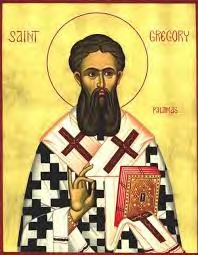 I have been sharing St. Gregory’s thoughts about the “mystery and wonder of the Trinity.” Indeed it is the one dogma – the Trinity – that makes our Christian religion so very different from other religions. It is an idea about God that retains the idea of ONE GOD Who is also THREE DISTINCT PERSONS. And, as I have repeatedly stated, it is the one understanding of God that directly connects us humans to God since the Son, the Second Person, was incarnate as a human person and still retains a glorified body. He did not stop being the GOD-MAN after his death and resurrection.
I have been sharing St. Gregory’s thoughts about the “mystery and wonder of the Trinity.” Indeed it is the one dogma – the Trinity – that makes our Christian religion so very different from other religions. It is an idea about God that retains the idea of ONE GOD Who is also THREE DISTINCT PERSONS. And, as I have repeatedly stated, it is the one understanding of God that directly connects us humans to God since the Son, the Second Person, was incarnate as a human person and still retains a glorified body. He did not stop being the GOD-MAN after his death and resurrection.
Because of this great mystery, we have a real and intimate connection with our God. He is our model of how to live this earthly life and to gain a real and true understanding of the meaning and purpose of this earthly life.
Gregory continues in this fashion. A further question presents itself. If the Father as unbegotten and the Son as begotten are indeed distinct from one another, they are obviously not the same. How can they both be the same God? Gregory poses the question as follows: “For if to be unbegotten is the essence of God, to be begotten is not that essence; if the opposite is the case, the unbegotten is excluded. What argument can contradict this?
All depends. Gregory argues, on what we mean when we say that the unbegotten and the begotten are not the same. Certainly, he agrees, “the unoriginate and the create are not of the same nature.” Is such the case with the Father and the Son? “But if you say that he that b begot and that which is begotten are not the same, the statement is inaccurate to say the least. For it is in fact a necessary truth that they are the same. For the relation of father to child is this: that the offspring is of the same nature with the parent. Think, Gregory coaches, of Adam. “Was he not alone the direct creature of God,” created in a unique manner by God? Does this mean that Adam was the only human being? Hardly. Other humans “begotten” by normal procreative means are clearly also human. What is Gregory’s point? “Just so neither is he who is unbegotten alone God, though he alone is Father.”
I present Gregory’s arguments to stimulate you, my readers, to think about Who God Is For You!
